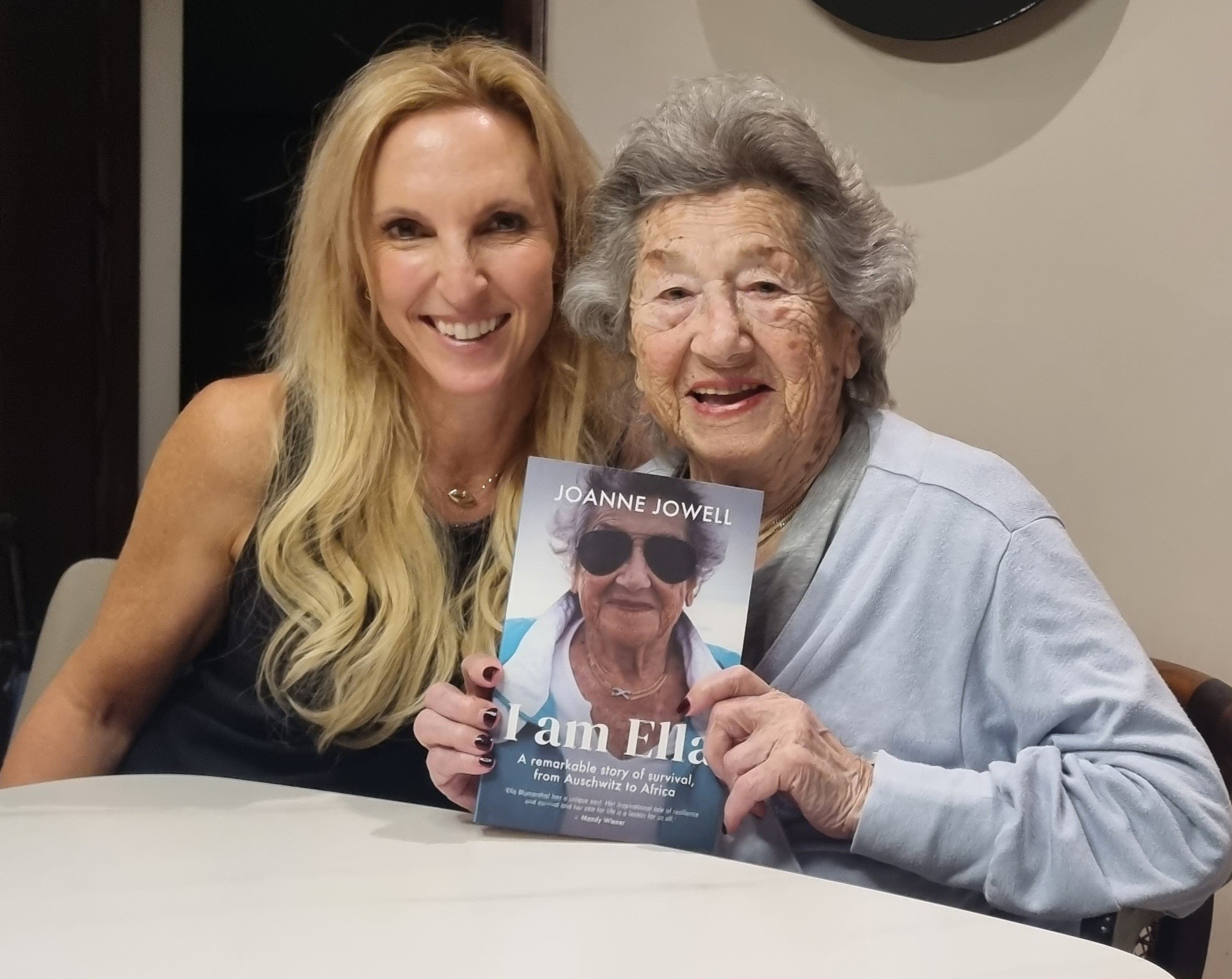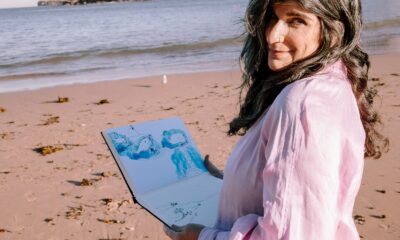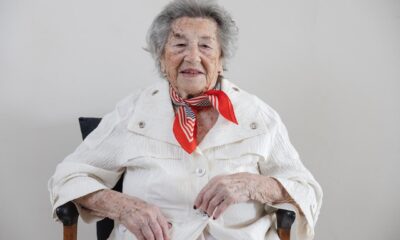
Featured Item

I am Ella shows real-life hero in full colour
Cape Town author Joanne Jowell recently launched her latest biography, I am Ella, about Holocaust survivor Ella Blumenthal. The SA Jewish Report speaks to her about it.
How did you get involved in writing this book?
Ella’s daughter, Evelyn Kaplan, called me in 2017 after reading one of my other books and asked if I would help the Blumenthal family to record Ella’s story for their own archives. She didn’t have any plans for a published book at that stage. Their mission was to create a full, written account of their mother’s life for their children and grandchildren.
What drew you to her?
The very name “Ella Blumenthal” drew me to Ella. She has become a well-known figure in the Jewish community, particularly in Cape Town, and her magnetism is famed.
Describe Ella.
Ella is the coolest centenarian you’ll ever meet. She has deep faith in Hashem, and is full of vitality and compassion. She’s sassy, street-smart (yes, even these 21st century streets), and mischievous. She has a keen eye for detail and design (her parents had a textile business in Warsaw, and Ella and her husband, Isaac, ran a clothing business for many years), and I have never seen her nails unvarnished. She holds and imparts an enviably positive outlook on life.
How did you research the book?
My main source is always my protagonist – in this case, Ella herself. We spent many hours talking, and she took me through her extensive personal archives of articles, books, photographs, and artefacts.
I had done some academic study of the Holocaust during university, and have always had an interest in Holocaust novels and books. Before the COVID-19 pandemic lockdown, I enjoyed a Melton (School of Adult Jewish Learning) course about the Holocaust as reflected in diaries and memoirs, and was fortunate to have the expert eye of Richard Freedman, educator and director of the Cape Town Holocaust & Genocide Centre, to review the manuscript and write the foreword for I am Ella. I drew on my own visit to Poland some years before I ever knew I would write Ella’s story, where perhaps a prescience took me to many of the places where Ella herself once lived: Warsaw, where Ella grew up; the Warsaw Ghetto and Mila Street where Ella hid and survived the uprising; Majdanek, where Ella literally walked free from a gas chamber; and Auschwitz, where Ella was one of the early prisoners. I also found the numerous Holocaust museums and centres around the world to be invaluable and generous resources.
Ella’s story has been told in a recent documentary. How is this book different?
Sanktuary Films’ documentary, I Am Here, has deservedly collected multiple awards for its moving depiction of Ella’s life story using a clever mix of interviews, film footage, and animation. The written version of Ella’s life can obviously provide far greater detail and, although we have included many photographs in the book, it’s the words that must fill in the colour. My own style of non-fiction writing is to include myself as a character. I occupy the place of the reader. I can ask the hard questions, probe deeply, follow tangents, and offer multiple perspectives to create the most rounded account of a long and full life. This approach adds dimension and depth to memoir. My aim is for the reader to feel that they build their own relationship with the remarkable Ella, with me as their proxy.
Describe the process of writing it.
First comes the relationship. Then the writing.
I spent many hours with Ella during which we got to know one another and shared much more than her responses to my interview questions. We drank tea, ate biscuits, she asked about me, and I asked about her. Nothing was off limits. I didn’t want to contain or restrict Ella in any way, nor force her to stick to the chronology of her life story, because memory isn’t linear.
Two other books, a literary festival, and a global pandemic then got in the way, and I settled down to write Ella only about four years after we met for our first interview. We topped it all off with some additional family interviews right near the end of the writing process – these were a highlight! The writing took about nine months from pitch to edit.
What made you choose the title?
When you read the book, you’ll discover that there’s a fascinating story behind Ella’s name, so the simple statement, “I am Ella”, is in fact quite complex and layered. The title is also a declaration of strength and a statement of identity. (Do you know that she has never been able to reclaim her Polish citizenship after being relegated stateless by the war?) It’s also an evolution of the beautiful title of the documentary, I Am Here, in that it proclaims, “I survived; though I died many times. I’m here, I thrive at life, and am still here to tell a remarkable tale. I know who I am – all of who I am – and I want you to know me too. I am Ella.”
What makes her story so remarkable (as opposed to other survivors)?
Every single survivor story is remarkable and, as Dr Edith Eger puts it, “There’s no hierarchy of suffering.” But Ella’s story reads like a hit list of Holocaust hot-spots, and her experience in Majdanek of being sent to the gas chambers and then released from that certain death, is unique. Apart from her jaw-dropping story of surviving the Holocaust, there’s the fullness of her fascinating life experience after liberation: wheeling and dealing in Paris; moving to Palestine under a false identity; becoming engaged to her South African fiancé after just 13 days; relocating to the tip of Africa; hiding her survivor status; building a loving family and a successful business; learning to speak her mind and her heart; living a life of jubilance, mischief, and gratitude. This is what makes Ella and her story so remarkable.
Why do you believe people should read this book?
So many people tell me that they can’t read Holocaust stories, that they can’t watch Holocaust movies, that they could never bring themselves to visit the concentration camps … they simply find it too painful to engage with the subject. To them, and to everyone, I say: this book is so much more than a Holocaust story. Ella has been blessed to live a long and full life. Though her war years were certainly formative, they don’t comprise her life’s majority. While this book obviously deals with the horror of the Holocaust, it’s also replete with the humour and beauty of Ella’s life before and after the war. You may even laugh more than you cry. Stylistically, the story moves back and forth between past and present; it’s always infused with Ella’s infectious personality and her incredible capacity to find light in the darkness. So, even when you read about overwhelming cruelty and inhumanity, you are always bolstered by the living, breathing strength of your incomparable guide through that underworld – Ella, remarkable Ella. And you know how the story ends – with survival, with life.
What impact has Ella had on you and, perhaps, your family’s life?
Ella embodies the lesson “Don’t sweat the small stuff”, always reminding me to zoom out, consider the bigger picture, and approach life as an adventure. Her outlook has become a barometer for my own approach to challenges, even ones as seemingly insurmountable as a global pandemic (which Ella simply knew she would get through too, and which she used as an opportunity to further connect with her family, near and far, and appreciate the beauty of her world).
My children are equally drawn to her – as they should be, because this book was written for them and future generations so that we never forget, and we remind ourselves how to live.
Has working with Ella had an impact on your view of the Holocaust?
Even though I had read many Holocaust stories and visited Poland and the camps, I gained a whole different appreciation and resonance through Ella. She also actualised the mythical – names like Mordechai Anielewicz, Adam Czerniakow, Janusz Korczak; places like Mila Street, the gas chambers of Majdanek, post-war Paris … these are people and places on which Ella had laid her very own eyes. For me, she turned the black-and-white of history into full colour, and she made me see that we’re all connected, affected, and obligated to perpetuate memory.
What do you want your readers to take home?
Consider this book an opportunity to meet and get to know a real survivor, a hero in real life. My fervent wish is that once you’ve read I am Ella, you’ll feel as if you, too, have met Ella, spent hours in deep conversation with her, and have enjoyed tea and biscuits in her merry company.










